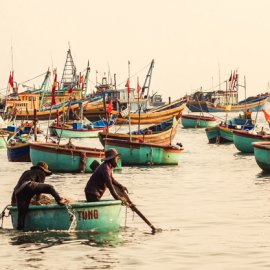RESCUE, part 31: World Ocean Culture
-
English
-
ListenPause
[intro music]
Welcome to World Ocean Radio…
I’m Peter Neill, Director of the World Ocean Observatory.
The ocean is our origin; we come from and are made of water, as the source and essence of our being. Water is life. As such, in its breadth and duration, it defines our culture, our every thought and act, our every ritual, our every story of birth and death, of lives depicted on an oceanic scape of exploration, warfare, exchange of goods, people, and ideas. The metaphor is constant: flow and flowing, heal and healing, flood and flooding, food and feeding – a continuum of need and fulfillment, ofttimes expressed in image, song, myth, action, architecture, reaction, heroism, invention, and exchange – in all the many measures and distributed histories of civilization.
We fight wars on land and sea; we fight culture wars. If you can look behind these conflicts, beyond the millions over time who have died in defense of a territory or a religion, you will find a clash of origins, a revelation of a cultural occlusion, that asserts one idea over another, one empire against the next, one certainty that defies all other certainties, without understanding or accommodation. Indeed, we fight wars for water, toward the appropriation of flow, heal, flood, and food, for ourselves, against themselves, to the detriment, exclusion, or death of us all. Sometimes we do not need an external enemy to create the conflict; sometimes we do it to our own selves, with premeditation, or without thinking, but the outcome is the same: a final interruption, an ultimate demise of and by the natural forces that sustain culture, thus community, thus civilization itself. Without water, there is nothing.
We are surrounded by evidence of our cultural ocean. We can see it easily at the coastline, by the lakes and rivers, in the passages of rain and run-off that shape the land. We can see it in our geology, the rocks and ledges that signal glacial movement and withdrawal aeons ago. We can see it in the location of our towns and cities along or at the confluence of rivers. We can see it in our attempts to manage water: to cross it by bridges, to retain it by dams, to divert it away by culverts and pipes from places we’ve settled and made safe. In the harbors, we see fishboats; on the horizon, we see distant ships; in the ports, we see the cars and containers that are evidence of maritime trade. We can visit sites of world heritage. We can go to the museums, collected culture, fine art and maritime, where we see paintings of historical battles, vibrant dockside exchanges, vessels of war, under oar and sail, in ragged smoky conflict. We see slavery; we see acculturation; we see moments, waterside, of contemplation.
And now, as technology allows us to dive deeper, we can see the thousands of wrecks, men and treasure lost at sea, as if the ocean can hold no secrets, no evidence hidden of the long story of water and our dependence on it. Every place has its ocean culture, even as we carry in us as vessels for sustenance and survival. Every person is a drop of the ocean, in life, even in death, as we return from materiality to spirit, we simply evaporate. Our terrestrial lives are as wide, and deep, and dynamic as the ocean itself – from microscopic entities, invisible to the human eye, to the works of unknown human hands—marks on cave walls, crafted objects, skyscrapers, engines and inventions, and machines that exchange our ideas and love letters at the speed of light. That’s what at stake as we face forces of our own devising, ironically terminal, at least by implication, that should focus us on the essential value proposition that is the uniqueness of our being, that we can, and must, act together to preserve this world ocean culture, and to meet such an existential imperative, to preserve civilization and to affirm our future. We must cleave to RESCUE: R for renewal; E for environment; S for society; C for collaboration; U for understanding; and E for engagement.
We will discuss these issues, and more, in future editions of World Ocean Radio.
[outro music]
This week on the RESCUE series we're continuing our discussion of the water cycle and the ways it defines our cultural identity from global to local. We are surrounded by evidence of our cultural ocean: we see it at all shores both fresh and salt, we see it the location of our settlements, in our bridges and dams, in fishing vessels and practices, in ports, and so much more. In this episode we'll explore these myriad connections in depth.
About World Ocean Radio
Peter Neill, Director of the World Ocean Observatory and host of World Ocean Radio, provides coverage of a broad spectrum of ocean issues from science and education to advocacy and exemplary projects. World Ocean Radio, a project of the World Ocean Observatory, is a weekly series of five-minute audio essays available for syndicated use at no cost by college and community radio stations worldwide.
See the entire RESCUE series under the SOLUTIONS banner.
- Login to post comments



